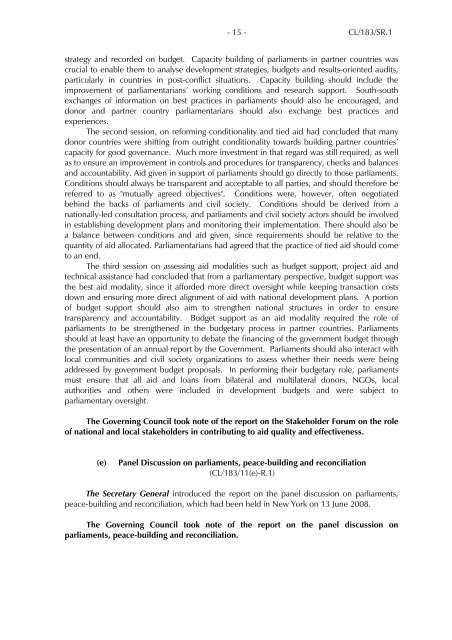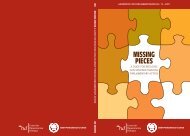CASE No - Inter-Parliamentary Union
CASE No - Inter-Parliamentary Union
CASE No - Inter-Parliamentary Union
Create successful ePaper yourself
Turn your PDF publications into a flip-book with our unique Google optimized e-Paper software.
- 15 - CL/183/SR.1<br />
strategy and recorded on budget. Capacity building of parliaments in partner countries was<br />
crucial to enable them to analyse development strategies, budgets and results-oriented audits,<br />
particularly in countries in post-conflict situations. Capacity building should include the<br />
improvement of parliamentarians’ working conditions and research support. South-south<br />
exchanges of information on best practices in parliaments should also be encouraged, and<br />
donor and partner country parliamentarians should also exchange best practices and<br />
experiences.<br />
The second session, on reforming conditionality and tied aid had concluded that many<br />
donor countries were shifting from outright conditionality towards building partner countries’<br />
capacity for good governance. Much more investment in that regard was still required, as well<br />
as to ensure an improvement in controls and procedures for transparency, checks and balances<br />
and accountability. Aid given in support of parliaments should go directly to those parliaments.<br />
Conditions should always be transparent and acceptable to all parties, and should therefore be<br />
referred to as "mutually agreed objectives". Conditions were, however, often negotiated<br />
behind the backs of parliaments and civil society. Conditions should be derived from a<br />
nationally-led consultation process, and parliaments and civil society actors should be involved<br />
in establishing development plans and monitoring their implementation. There should also be<br />
a balance between conditions and aid given, since requirements should be relative to the<br />
quantity of aid allocated. Parliamentarians had agreed that the practice of tied aid should come<br />
to an end.<br />
The third session on assessing aid modalities such as budget support, project aid and<br />
technical assistance had concluded that from a parliamentary perspective, budget support was<br />
the best aid modality, since it afforded more direct oversight while keeping transaction costs<br />
down and ensuring more direct alignment of aid with national development plans. A portion<br />
of budget support should also aim to strengthen national structures in order to ensure<br />
transparency and accountability. Budget support as an aid modality required the role of<br />
parliaments to be strengthened in the budgetary process in partner countries. Parliaments<br />
should at least have an opportunity to debate the financing of the government budget through<br />
the presentation of an annual report by the Government. Parliaments should also interact with<br />
local communities and civil society organizations to assess whether their needs were being<br />
addressed by government budget proposals. In performing their budgetary role, parliaments<br />
must ensure that all aid and loans from bilateral and multilateral donors, NGOs, local<br />
authorities and others were included in development budgets and were subject to<br />
parliamentary oversight.<br />
The Governing Council took note of the report on the Stakeholder Forum on the role<br />
of national and local stakeholders in contributing to aid quality and effectiveness.<br />
(e)<br />
Panel Discussion on parliaments, peace-building and reconciliation<br />
(CL/183/11(e)-R.1)<br />
The Secretary General introduced the report on the panel discussion on parliaments,<br />
peace-building and reconciliation, which had been held in New York on 13 June 2008.<br />
The Governing Council took note of the report on the panel discussion on<br />
parliaments, peace-building and reconciliation.
















